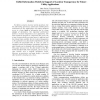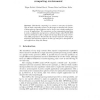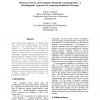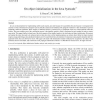3206 search results - page 35 / 642 » How minds can be computational systems |
103
click to vote
HICSS
2006
IEEE
15 years 6 months ago
2006
IEEE
For future scenarios of power system operations, like the self healing grid vision, system and communications architecture are key. Applications will require unlimited access to a...
PVM
1998
Springer
15 years 4 months ago
1998
Springer
Abstract. Distributed computing is a means to overcome the limitations of single computing systems. In this paper we describe how clusters of heterogeneous supercomputers can be us...
NN
2008
Springer
14 years 11 months ago
2008
Springer
dely acknowledged that categorically organized abstract knowledge plays a significant role in high-order human cognition. Yet, there are many unknown issues about the nature of ho...
105
click to vote
HICSS
2003
IEEE
15 years 5 months ago
2003
IEEE
This conceptual paper suggests how Politeness Theory [6] – well known in anthropological and linguistic literatures – can contribute to the study of role relations in computer...
COMCOM
2000
14 years 11 months ago
2000
Java is an ideal platform for implementing mobile code systems, not only because of its portability but also because it is designed with security in mind. Untrusted Java programs ...




